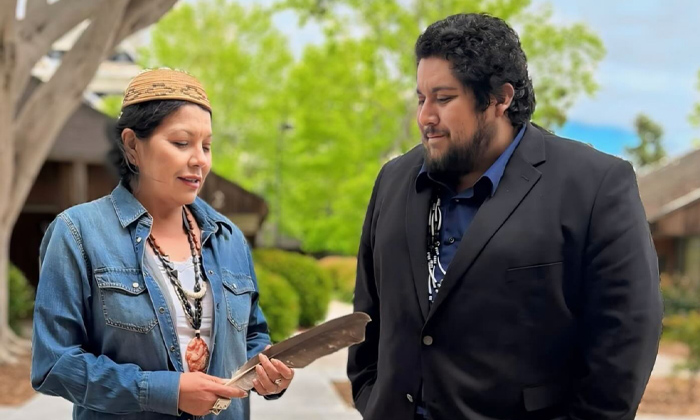
- Details
- By UC San Diego School of Medicine
“If you don’t ask, the answer is always no.” A catchy phrase penned by romance novelist Nora Roberts, this adage encourages each of us to ponder why things are the way they are, to ask questions when we see injustices and for University of California San Diego School of Medicine student Alec Calac, Ph.D. to ask “why can’t we” with regards to training a workforce reflective of and committed to promoting health and wellness among communities with unmet needs.
Born and raised in San Diego, Calac is a member of the Pauma Band of Luiseño Indians, one of the 18 federally recognized tribes in San Diego County. He has dedicated his life to service and promoting healthier generations of Native Americans, much like his father Daniel Calac, M.D., chief medical officer at the Indian Health Council in the Pauma Valley, who also trains medical students through a School of Medicine elective course, Tribal Ambulatory Health Care Experience.
“I find the greatest joy when I work in community and can motivate youth to pursue their own passions,” said Calac, who has spent the last several years focusing on tribal public health, health care policy and workforce development, in addition to attending medical school and earning a Ph.D. through the UC San Diego/San Diego State University Joint Doctoral Program in Public Health with a concentration in Global Health.
Calac has been recognized with several national and regional awards for his dedication to service and lifting up those who need a hand. Additionally, he lent his expertise to the Biden-Harris Administration as part of a health equity roundtable series. A recent award includes the American Medical Student Association (AMSA) 2024 Racial Justice in Medicine Award. The award recognizes his exceptional dedication to advancing Indigenous health equity and advocating for racial and social justice in medicine.
In recognizing Calac, the awards committee noted his, “demonstrated unparalleled commitment to incorporating anti-racist praxis and addressing health disparities faced by Native American communities. His leadership and involvement in the Association of Native American Medical Students, as well as the Clinical Problem Solvers Anti-Racism in Medicine Series, has facilitated critical discussions and raised awareness about the urgent need for systemic change.”
In addition to the AMSA award, he was also selected as a 2024 Bouchet Scholar. The prestigious, Bouchet Graduate Honor Society recognizes scholars whose commitment to social justice, diversity, leadership and academic excellence pushes the boundaries of doctoral education.
The Social Mission Alliance, a national movement, focused on health equity and training health professionals as agents of more equitable health care, honored Calac with the Fitzhugh Mullan Rising Star Award earlier this year. The award announcement noted his efforts leading national health policy efforts linked to Native American priorities through his roles in several major national advocacy organizations.
Acknowledging his impact and commitment to advancing health equity in medicine and public health, he was also one of five medical students nationwide to receive the 2024 Herbert W. Nickens Medical Student Scholarship from the Association of American Medical Colleges. The award is given to outstanding students entering their third year of medical school who have shown leadership in efforts to eliminate inequities in medical education and health care. Recipients have also demonstrated leadership initiative in addressing educational, societal and health care needs of racial and ethnic minorities in the United States.
Calac was also recently recognized locally with the Inaugural Student-Centeredness Award which celebrates acts of student-centeredness within the UC San Diego community. Awarded by the Vice Chancellor for Student Affairs and Campus Life, Associated Students and the Graduate and Professional Student Association, Calac and others were recongized for going above and beyond to put students first; Innovating in their approaches, and; championing diversity, equity, and inclusion across our campus.
Now as a third-year medical student Calac is continuing his medical school education and finding ways to continue his efforts to improve tribal public health, health policy, and medical education as a physician-scientist focused on Native American health.
“I am committed to advancing my training in a physician-scientist training program and continuing my work focused on the health and wellness of American Indian and Alaska Native patients served by academic medical centers and the Indian Health Service,” said Calac. “I am excited for the future as a physician-advocate for generations yet to be born.”
Help us defend tribal sovereignty.
At Native News Online, our mission is rooted in telling the stories that strengthen sovereignty and uplift Indigenous voices — not just at year’s end, but every single day.
Because of your generosity last year, we were able to keep our reporters on the ground in tribal communities, at national gatherings and in the halls of Congress — covering the issues that matter most to Indian Country: sovereignty, culture, education, health and economic opportunity.
That support sustained us through a tough year in 2025. Now, as we look to the year ahead, we need your help right now to ensure warrior journalism remains strong — reporting that defends tribal sovereignty, amplifies Native truth, and holds power accountable.
 The stakes couldn't be higher. Your support keeps Native voices heard, Native stories told and Native sovereignty defended.
The stakes couldn't be higher. Your support keeps Native voices heard, Native stories told and Native sovereignty defended.
Stand with Warrior Journalism today.
Levi Rickert (Potawatomi), Editor & Publisher

